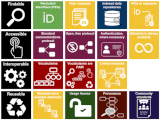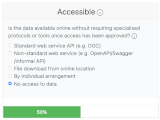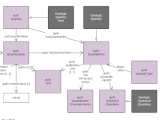Learning centre
In teaching others, we teach ourselves.

What is FAIR Data?
FAIR data principles make your Data Findable, Accessible,
Interoperable, and Reusable (FAIR).
FAIR data and the
underlying standards, tools and practices can help you deal with
the increasing data volume, data velocity, and data complexity.
Read now.

FAIR data self assessment tool
Use this tool to assess whether your data is 'FAIR' - Findable, Accessible, Interoperable, Reusable. Measure your maturity across the four areas. Read now

What is an ontology? (and why you need one)
An ontology describes things, the attributes of a thing, and the relationship between a thing and other things. You've been using ontologies all your life - now it's time to adopt an ontological approach to your data. (coming soon)

What is Linked Data?
Linked Data lies at the heart of what Semantic Data: enabling large scale integration of, and reasoning on, data. Linked Data lets you create rich data relationships for a single global information space. (coming soon)

Why you need to use Semantic Data
Semantic data is the keystone to a new age of computing where machines are better able to process and "understand" the data that they merely display at present. (coming soon)

The geological properties ontology
A semantic data model for mineral and energy resource exploration. Read now.

What is modern master data management?
New techniques for master data management are here - vocabularies, knowledge-graphs, linked data, SKOS, SPARQL. (coming soon)

What is a data catalogue?
A Data Catalogue is an index of all of your organisational data in digital, physical, or federated form. It may be the most valuable investment you make in your data. (coming soon)

5 reasons why you need to move to a cloud data warehouse
Find out how you can exploit the cloud for scalability, security, integration, and cost reduction. (coming soon)

What is Simple Knowledge Organisation System (SKOS)?
SKOS is a formal data model - Simple Knowledge Organization System - for expressing the basic structure and content of concept schemes such as thesauri, classification schemes, subject heading lists, taxonomies, other types of controlled vocabulary. (coming soon)

Why you should be using a Graph Database
Relational databases are struggling to keep up with the increasing complexity of data, the variety of sources, and the depth of relationships of data both internal and external. Graph databases provide inference reasoning - essential for machine learning. (coming soon)

5 Star data - how it can help your data maturity journey
Use the 5 Star rating scheme to evaluate your data maturity. While mostly used for open data, it is also valuable for rating private data. (coming soon)